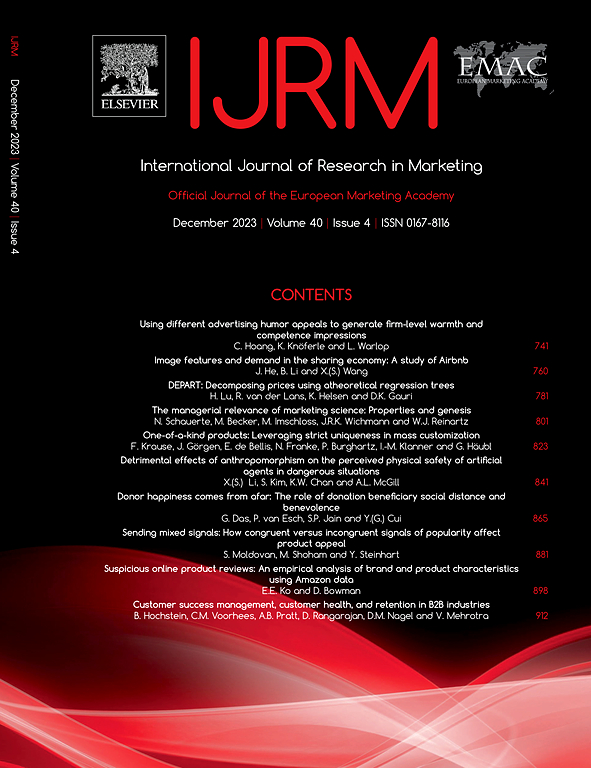Introducing specialist private labels: How reducing manufacturers’ competing assortment size affects retailer performance
IF 7.5
2区 管理学
Q1 BUSINESS
International Journal of Research in Marketing
Pub Date : 2025-03-01
DOI:10.1016/j.ijresmar.2024.08.002
引用次数: 0
Abstract
Grocery retailers are increasingly introducing specialist private label products, leading to competition with manufacturers’ national brand products. In turn, retailers might consider reducing specialist national brand assortment size, but how this affects retailer performance is unclear. To address this question, this research analyses store-level scanner data before and after the launch of a specialist organic private label (OPL) line in 13 product categories. The results indicate that OPL introduction leads to significant reductions in organic national brand (ONB) assortment size. This amplifies OPL success by strengthening the positive relationship between OPL assortment size and OPL market share. However, while reducing ONB assortment size can amplify OPL success, it decreases overall sales in the category. A key contextual factor is the degree of organic product penetration in the category assortment. When organic penetration is lower, the beneficial effects of reducing ONB assortment size for the OPL line are weaker and the harmful effects for the category stronger. These findings provide novel insight into how disinvesting in national brand assortments when launching specialist private label products helps and harms retailers. That is, retail stores may be better off not reducing national brand assortments because doing so can result in a ‘larger share of a smaller pie’, especially when penetration of products with the specialist attribute is low.
引入专业自有品牌:减少制造商竞争品种大小如何影响零售商绩效
杂货零售商越来越多地推出专业的自有品牌产品,导致与制造商的民族品牌产品的竞争。反过来,零售商可能会考虑减少专业国家品牌的分类规模,但这如何影响零售商的业绩尚不清楚。为了解决这个问题,本研究分析了13个产品类别的专业有机自有品牌(OPL)线推出前后的商店级扫描仪数据。结果表明,OPL的引入导致有机民族品牌(ONB)分类规模的显著降低。这通过加强OPL分类规模和OPL市场份额之间的正相关关系,放大了OPL的成功。然而,虽然减少ONB分类规模可以扩大OPL的成功,但它会降低该类别的整体销售额。一个关键的语境因素是有机产品在类别分类中的渗透程度。当有机渗透度较低时,减小ONB分类尺寸对OPL品系的有利影响较弱,而对品系的有害影响较强。这些发现提供了新颖的见解,说明在推出专业自有品牌产品时,减少对国家品牌的投资是如何帮助和损害零售商的。也就是说,零售商店最好不要减少国家品牌的分类,因为这样做可能会导致“在小蛋糕中获得更大的份额”,特别是在具有专业属性的产品渗透率较低的情况下。
本文章由计算机程序翻译,如有差异,请以英文原文为准。
求助全文
约1分钟内获得全文
求助全文
来源期刊
CiteScore
11.80
自引率
4.30%
发文量
77
审稿时长
66 days
期刊介绍:
The International Journal of Research in Marketing is an international, double-blind peer-reviewed journal for marketing academics and practitioners. Building on a great tradition of global marketing scholarship, IJRM aims to contribute substantially to the field of marketing research by providing a high-quality medium for the dissemination of new marketing knowledge and methods. Among IJRM targeted audience are marketing scholars, practitioners (e.g., marketing research and consulting professionals) and other interested groups and individuals.

 求助内容:
求助内容: 应助结果提醒方式:
应助结果提醒方式:


